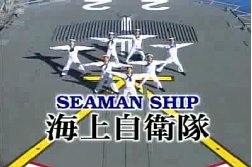Eggcorn continuum with a gay core
Encore un billet anglais sur les eggcorns, ces réanalyses sémantiques et étymologiques aboutissant à des graphies non généralement accepté, des paronymes clandestins pour ainsi dire.
This is a followup to my previous post on eggcorns, ie not universally accepted variant spellings created by an individual by way of a process similar to folk etymology (“étymologie populaire” voir ici).




Here is a new one: peace core. 3,360 gHits, a few of which are puns or refer to at least one bible study group and one punk rock band, respectively. The original, peace corps, scores 1,230,000, from which we calculate ratio of 36.6.
It came to me in the following sentence:
Is it time to split the SDF into the armed forces and a kind of peace core? (link)
This example is taken from an online commentary on a recruitment ad for the Japanese Maritime Self-Defense Forces (JMSDF) and was written by someone who is probably not a native speaker, but the process should be independent of that. Here, just like in many of the legit (ie native-speaker produced) instances on google, we find the idea of centrality: a central task of an army (or, alternatively, a possible task for a central part of an army) ought to be peacekeeping work.
[The ad is old news, so it doesn’t get its own blog entry. It must be the campiest armed forces recruitment ad ever designed. You can watch the video in all its 15 sec Village People inspired Macromedia Flash glory. For those who won’t or can’t view it, and just to add a bit of colour to this post, I have taken the stills you see on the right. (Image Credit: JMSDF.)
Blogger Joi Ito comments, “It’s a bit embarrassing as a Japanese, but I guess it makes us look less threatening.” A hat tip to Dave, who pointed me to the link and translates the text as “you love Japan, you love peace: join the navy”.
The form seaman ship, with the suffix ship comming loose, jumps out as well. I imagine another semantic process going on in someone’s mind: “By joining the Japanese seaman ship community you will find friend ship and not hard ship on our battle ships.” Or so.]
But back to eggcorn formation. I have been wondering how to distinguish genuine eggcorns from accidental misspellings of one of those pesky sounds of English that come in a variety of spellings. Sometimes, it might not be clear whether the coinage was triggered by a semantic ingredient or motivation. Let’s take the sound [eə] (or [eɚ] for rhotic varieties, like most of American English). It is spelled “air” in air or pair, “ear” in bear or pear, “are” in bare, just to cite the most common spellings.
Some gHit comparisons:
- bear hug vs bair hug vs bare hug: 84,000 vs 2 (the rest refer to a trade mark) vs 207; ratios 42,000 (large error included) and 406.
- pair[-]shaped vs pair[-]shaped vs pare[-]shaped: 269,000 vs 1,300 vs 70; ratios 207 and 3840.
Even if many of the occurences of bare hugs and pair shaped (and their variants) might by no means be the product of a conscious mental process, there is a clear “eggcorn factor” — the more it makes sense, the likelier is a misspelling — in those numbers. (Note that its being a conscious construction is not even a necessary condition for an eggcorn.) Personally, I am inclined to count particularly heartfelt bare hugs and some of the occurrences of pair-shaped as eggcorns. These “pair-shaped pink sapphire earrings” do come in pairs, after all.
In misspellings of loan words, a force of attraction towards spellings of analogous English terms can be observed. Thus, au contraire obtains 59,000 gHits, vs 1,200 for au contrair (ratio: 49.2), 1,490 for au contrare (ratio: 39.6) and only one for au contrear. Arguably, contrare is closer to the English word contrary than contrair, even though the latter is closer to the original contraire; either is much more prevalent than contrear. None is an eggcorn.
Billets connexes : Sappho II, Thy "thee"s, Ed Felten..., Show me your vowels!, Amuse-bouche to zaibatsu, Eggcorns in the air, Confront your inner butch, Faux amis
Technorati (tags): language


Actually, I hastily transcribed… the last part is not exactly “join the navy”, simply “Japanese Marine Self Defense Force” (海上自衛隊: “Kaijoujieitai”…) It’s also kind of hard to translate the first part really accurately, seing how Japanese lacks any expression of the actual subject in their sentence… the sentence, depending on context, could equally well be translated “he likes Japan”, “they like Japan”, “you like Japan”, “we like Japan” etc. in fact, I would suspect there is a bit of voluntary overlap, but I ANAJT…
Anyway, just a parenthesis.
Thanks to dr Dave for his clarification. I haven’t edited the entry; “join the MSDF” is, after all, the message of the ad. Shall people read the comments!